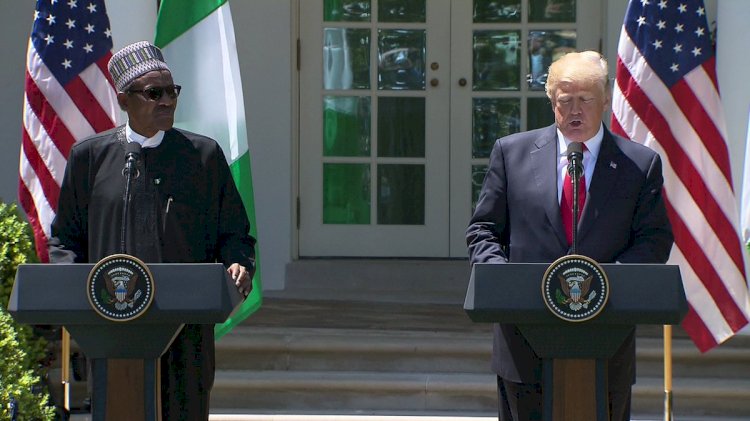New U.S. travel ban shuts door on Africa’s biggest economy, Nigeria

The visa rules will affect nearly a quarter of the people on the African continent, including many hoping to join loved ones already in the U.S.
The newlyweds had already been apart for half their yearlong marriage. Miriam Nwegbe was in Nigeria. Her husband was in Baltimore, and until she could join him, everything was on hold: finding a home together, trying for their first baby, becoming an American family.
Then, on Friday, their lives were thrown into disarray by the expansion of President Trump’s ban on immigration to include six new countries, including four in Africa. Nigeria, the continent’s most populous nation, was one of them.
“America has killed me,” Ms. Nwegbe’s husband, Ikenna, an optometrist, texted her when he heard. “We are finished.”
A year after the Trump administration announced that a major pillar of its new strategy for Africa was to counter the growing influence of China and Russia by expanding economic ties to the continent, it slammed the door shut on Nigeria, the continent’s biggest economy.
The travel restrictions also apply to three other African countries — Sudan, Tanzania, and Eritrea — as well as to Myanmar, which is accused of genocide against its Muslim population, and Kyrgyzstan, a former Soviet state.
The ban will prevent thousands of people from being able to move to the United States.
The initial ban, which was put into effect in 2017, restricted travel from some Muslim-majority countries as part of Mr. Trump’s plan to keep out “radical Islamic terrorists.” It has already affected more than 135 million people — many of them Christians — from seven countries.
With the new expansion, the ban will affect nearly a quarter of the 1.2 billion people on the African continent, according to W. Gyude Moore, a visiting fellow at the Center for Global Development, a research group, potentially taking a heavy toll on African economies — and on America’s image in the region.
“Chinese, Turkish, Russian, and British firms, backed by their governments, are staking positions on a continent that will define the global economy’s future,” he said, adding, “One hopes that the United States would follow suit and fully engage with the continent — but that hope fades.”
The rationale for the new restrictions varies depending on country, but the White House announcement said that most of the six countries added to the list did not comply with identity-verification and information-sharing rules.
And Nigeria, it said, posed a risk of harboring terrorists who may seek to enter the United States. The country has been hit brutally by the Islamist group Boko Haram, though the extremists have shown little sign that they have the capability to export their fight overseas.
Critics, many of whom also denounced the initial ban, saw something far more venal at play.
“Trump’s travel bans have never been rooted in national security — they’re about discriminating against people of color,” Senator Kamala Harris, the former Democratic presidential candidate, declared on Sunday. “They are, without a doubt, rooted in anti-immigrant, white supremacist ideologies.”
Two Democrats still in the race also weighed in. Elizabeth Warren described the measure as a “racist, xenophobic Muslim ban.” Former Vice President Joseph R. Biden Jr. called it “a disgrace.”
And Nancy Pelosi, the house speaker, said Democratic lawmakers would push ahead with a measure to forbid religious discrimination in immigration policy.
Beyond those people who may now never make it across American borders, the new ban could also affect millions who have no plans to travel to the United States themselves but may have benefited from the billions of dollars in remittances visa holders send home each year.
The United States may also emerge a loser, studies suggest. Nigerians are among the most successful and highly educated immigrants to America. (Mr. Trump, demanding
Source: New York Times

















